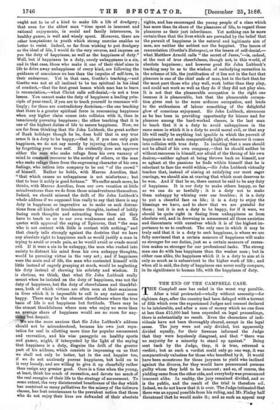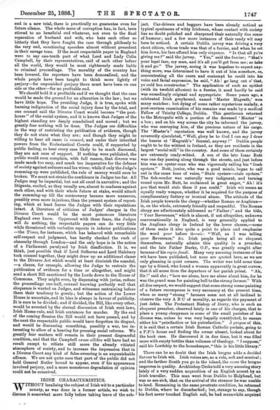THE END OF THE CAMPBELL CASE.
THE Campbell case has ended in the worst way possible. After a trial protracted—wholly without necessity—for eighteen days, after the country had been deluged with a torrent of filth which even the experienced Judges and counsel declared to be intolerable, and after a sum of money which no one fixes at less than £15,000 had been expended on legal proceedings, there is substantially no result. Even the characters of indi- viduals have not been thoroughly cleared, except in the legal sense. The jury were not only divided, but apparently divided equally, for their foreman informed the Judge that they were hopelessly disagreed, and that "there was no majority for a minority to stand up against." Being sent back by the Judge, they, it is true, returned a verdict; but as such a verdict could only go one way, it was comparatively valueless for those who benefited by it. It would have been monstrous for those jurymen to yield who inclined against the divorce, for they would have pronounced persons guilty whom they held to be innocent ; and so, of course, the yielding came from the other side, and everybody was pronounced innocent alike. In reality, the jury remained divided, and so is the public, and the result of the trial is therefore nil. Indeed, we do not know that it is over. The Judge intimated that there was an appeal possible from his ruling, and Mr. Finlay half threatened that he would make it ; and as such an appeal may
end in a new trial, there is practically no guarantee even for future silence. The whole mass of corruption has, in fact, been stirred to no beneficial end whatever, not even to the final separation of husband and wife, who hate each other so bitterly that they have fought the case through pitilessly to the very end, sanctioning speeches almost without precedent in their savage tone. If the most respectable paper in England were to say one-tenth part of what Lord and Lady Colin Campbell, by their representatives, said of each other before all the world, they would be most righteously made liable to criminal proceedings. The morality of the country has been lowered, the reporters have been demoralised, and the whole people have been taught to think more lightly of perjury—for unpunished perjury there must have been on one side or the other—for no profitable end.
We should hold it a profitable end if we thought that the case would be made the ground for an alteration in the law ; but we have little hope. The presiding Judge, it is true, spoke with burning indignation of the social injury done by the trial, and one counsel said the Divorce Court would become "the pest- house" of the social system, and it is known that Judges of the highest standing are deeply scandalised and moved ; but we greatly fear nothing will be done. The Judges see difficulties in the way of restricting the publication of evidence, though they do not state what they are ; and though they might be willing to hear all cases in camerci, and under their inherited powers from the Ecclesiastical Courts could, if supported by public feeling, so hear every case likely to be much discussed, they are not sure of support. If nothing were published, the public would soon complain, with full reason, that divorce was made much too easy, and much too inoperative for the defence of society against seducers and lax wives; while if only the Judge's summing-up were published, the rule of secrecy would soon be broken. We must not strain the confidence in Judges too far. All Judges may be impartial, but not all excel in narrative ; and the litigants, excited, as they usually are, almost to madness against each other, and with their whole future at stake, would attack the summing-up till the controversy became more nauseous, possibly even more injurious, than the present system of report- ing, which at least leaves the Judges with their reputations intact. A literature of criticism of Judges' charges in the Divorce Court would be the most poisonous literature England ever knew. Oppressed with these fears, the Judges will do nothing, the respectable papers can do very little while threatened with verbatim reports in inferior publications —the Times, for instance, which has behaved with remarkable self-respect and judgment, has hardly checked the rush of obscenity through London—and the only hope is in the action of a Parliament paralysed by Irish disaffection. It is, we think, just possible that if Lord Selborne and Lord Halsbury took counsel together, they might draw up an additional clause to the Divorce Act which would at least diminish the scandal, —a clause, for example, allowing the Judge to restrain the publication of evidence for a time or altogether, and might send a short Bill sanctioned by the Lords down to the House of Commons. They might even, by dispensing with juries, reduce the proceedings one-half, counsel knowing perfectly well that eloquence is wasted on Judges, and witnesses restraining before them their tendency to gossip ; but the action of the Lower House is uncertain, and its bias is always in favour of publicity. It is sure to be divided ; and if divided, the Bill, like every other, would be arrested by the eternal discussion of Irish rent laws, Irish Home-rule, and Irish sentences for murder. By the end of the coming Session the Bill would not have passed, and by the next the respectable public would have forgotten its disgust, and would be discussing something, possibly a war, too in- teresting to allow of a hearing for pressing social reforms. We greatly fear matters will remain in their present disgraceful condition, and that the Campbell cause celebre will have had no result except to vitiate still more the already vitiated atmosphere of society, and to increase the impression that in a Divorce Court any kind of false-swearing is an unpunishable offence. We are not quite sure that part of the public did not hold General Butler bound to appear, even if his appearance involved perjury, and a more monstrous degradation of opinion could not be conceived.



































 Previous page
Previous page